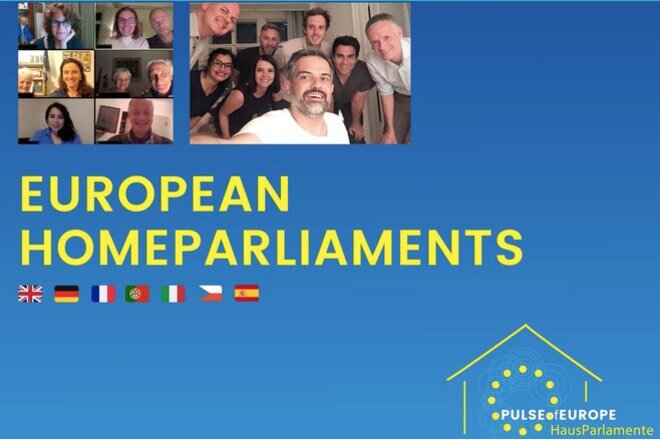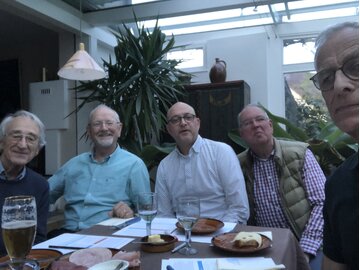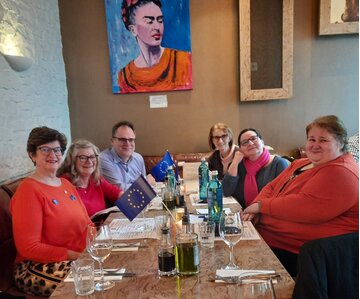投票に関する質問
Should the EU develop more resilience to face current global challenges?
With this 9th round of the European HomeParliaments, we are therefore focussing on the topic of "European resilience" and offering an opportunity to reflect on this: Should the EU develop more resilience to face the current global challenges?
背景
Dear participants, Welcome to the European HomeParliaments. We are delighted that you are taking part. 2024 is a special year: Europe is electing a new parliament. This election, like 2019, will be a landmark election and will play a huge role for democracy across the European Union. And that is why we are also in demand: climate, wars, migration, shortage of skilled labour, inflation... we are hardly used to positive news any more. Instead, frustration is growing among the population. We are in the midst of a "polycrisis": anxiety and powerlessness are spreading in Europe; many people are disappointed with politics and criticise it. Around 51 per cent of EU citizens are dissatisfied with the state of democracy and over 40 per cent of EU citizens do not trust the EU institutions. A full 64 per cent of people in Eastern Germany distrust the EU, which is the highest percentage in the entire European Union. Europe's democracy is under massive pressure: while authoritarian forces such as Russia and China are putting Europe's liberal and democratic societies to the test from the outside, the EU is struggling internally with growing polarisation, scepticism towards democracy, national egoism, and a feeling of alienation between citizens and politicians. But we can also learn something from crises, draw strengths from them and grow together. With this 9th round of the European HomeParliaments, we are therefore focussing on the topic of "European resilience" and offering an opportunity to reflect on this: Should the EU develop more resilience to face the current global challenges? We would like to invite you to debate and discuss three important questions on European resilience. As in a parliament, you will first be able to discuss the individual questions with each other and then vote on them individually. Together with the results of the numerous other European HomeParliaments taking place simultaneously in various European countries, the results will be incorporated into a comprehensive European overview and then discussed with EU politicians. Enjoy contemplating, discussing and voting. We look forward to your contribution to the future of European democracy.
サブ質問
1. Should the EU invest in European defence capabilities so that it can act independently in military conflicts?
背景: Not only the war in Ukraine, but also the conflict in the Middle East and many other crises in the world show that peace cannot be taken for granted. A global comparison shows that although the EU states invest considerable money in defence, their defence capability is low in the event of a crisis. Military support from the USA has so far been indispensable for Europe and Ukraine. However, with a view to the presidential elections in America at the end of the year, further support has been called into question and there is a real threat that the defence and military capabilities of a free Europe are no longer guaranteed, and thus the international order and all European states are not fully secure.
あたり
The likelihood that the USA will not be willing to stand up for European countries militarily and will gradually dismantle its military defence umbrella has increased significantly.
An independent military capacity is the prerequisite for the EU to be perceived as a global and robust player on an equal footing and not to be blackmailed by autocrats.
The commitment of the member states to the EU would increase, which contributes to strengthening the European identity and community. The likelihood of peace within Europe also increases.
コントラ
The hitherto successful division of roles between the EU (soft power) and NATO (hard power) will be undermined if the EU takes on NATO-like tasks, which could lead to conflicts in responsibilities and with international partners
The need for armament increases the temptation to resolve conflicts prematurely with armed force and weakens efforts to secure peace by non-military means.
The additional expenditure required for the military will damage the social fabric of the member states. Massive increases in expenditure are possible, leading to additional debt.
会議からの追加事項
This could even lead to a future growth in the economy, and technical evolution.
This would lead to duplication of effort and costs, considering what already present with NATO.
2. Should a compulsory service (e.g. defence, social, environmental) be introduced in the EU that can be performed in all Member States?
背景: For many young people, completing a voluntary year, whether social or ecological, or a voluntary service programme, is an important part of their lives, e.g. to gain important experience for the rest of their lives after leaving school. Many also want to make an important contribution to society abroad and develop their personality step by step. However, this service is not yet compulsory. Many graduates go straight to college or do an apprenticeship after graduating, and the requirements and conditions also vary within the EU. Some countries have state-sponsored programmes, while others are run by non-profit organisations or NGOs.
あたり
Social cohesion and European identity would be strengthened by young people getting to know other EU countries and meeting Europeans from different social classes and nationalities.
Young people can be supported in their personal development while also learning how to get become civically engaged. They also gain important experience for their professional orientation.
Compulsory service can be completed in many areas and go beyond the equivalent of a social voluntary service. Individual skills and wishes can be considered and taken into account.
コントラ
An administrative apparatus still to be built up, the financial and organisational costs for the EU (infrastructure, salaries, organisation, national services, etc.) increase the risk of additional bureaucracy and additional costs.
Personal freedom in individual life planning is restricted. In addition, professional training is likely to be delayed.
Such a service, including experience abroad, could lead young, motivated and capable people being shown the advantages of other EU member states, which could result in migration to "more attractive" EU states.
会議からの追加事項
This initial forcing pressure may open new worlds to people who otherwise would never enjoy such an experience.
Too much emphasis on forcing this to people may bring to counter reactions, against freedom principles?
3. Should the EU accelerate the green transition in the energy, mobility, and agricultural sectors?
背景: Climate and environmental protection are two much discussed and highly controversial topics that have attracted further attention, not least due to the many demonstrations and protests. With the Green Deal, Commission President Ursula von der Leyen has presented an ambitious proposal for more climate and environmental protection. But is it enough? Despite the ambitious targets within the deal, it is important to note that we are below the global target of a 1.5 degree rise in temperature. The "green transformation" aims to reshape the economy, society, and the environment sustainably to tackle environmental challenges and create a future for everyone. This transformation aims to reduce dependence on fossil fuels, minimise the consumption of natural resources, reduce pollution and combat climate change. The goals of the green transformation are, for example, energy transition with the promotion of renewable energies, a sustainable economy, environmental protection and social justice. The green transformation is therefore a multidimensional process that requires political decisions as well as technological innovations, changes in consumer behaviour and cooperation at an international level. It is an integral part of the endeavour to achieve sustainable development and tackle the challenges of climate change and environmental degradation.
あたり
The worsening climate crisis requires swift and effective action to limit its consequences.
Europe has contributed significantly to climate change. Only if a prosperous Europe successfully leads the way will other countries follow suit.
The green transformation is based on innovation and in this way secures future competitiveness and thus prosperity and jobs in the EU.
コントラ
The effectiveness of EU measures on climate development is limited if other major "polluter" states do not follow suit.
The transformation is associated with very high costs and rising debt, possibly also with a loss of prosperity for the population.
Citizens and industry are already under extreme pressure because of the coronavirus crisis. Many people and groups would not support a further intensification of the requirements.
評価
Should the EU develop more resilience to face current global challenges?
承認 24
拒否 0
棄権 3
受信者はこのように自分を表現する
Frage 1: Sollte die EU in die europäische Verteidigungsfähigkeit in einem Umfang investieren, dass sie in militärischen Auseinandersetzungen eigenständig handeln kann?
Die Verteidigungsfähigkeit Europas ist wichtig, ein erhöhtes Augenmerk auf unsere Sicherheit und Verteidigungsfähigkeit in den nächsten Jahren ist geboten, die EU wird sich der Sicherheits- und Verteidigungspolitik ausbauen müssen. Ziel ist ein starkes, sicheres und verteidigungsfähiges Europa, das jedoch im Einklang mit den bereits vorhandenen Strukturen des Verteidigungsbündnisses NATO ist.
Ein Europäisches Beschaffungswesen ist dafür ein erster, wichtiger Schritt. Deshalb unterstütze ich entsprechende Vorschläge zur Änderung der EU-Verträge.
Frage 2: Sollte in der EU ein verpflichtender Dienst (z.B. Verteidigung, Soziales, Umweltschutz) eingeführt werden, der in allen Mitgliedstaaten geleistet werden kann?
Ich bin gegen eine Einführung eines verpflichtenden Dienstes. Die Leistung eines freiwilligen Dienstes, ob im kulturellen, sozialen oder ökologischen Bereich, ist eine tolle Möglichkeit für junge Menschen, sich auszuprobieren und sich gesellschaftlich einzubringen. Häufig sind die Angebote dieser Dienste sehr an den Grenzen der jeweiligen Mitgliedsstaaten orientiert. Mit dem Europäischen Solidaritätscorps und den vielen Erasmus+ Programmen haben wir bereits tolle Möglichkeiten für junge Menschen, sich europaweit zu engagieren oder weiterzubilden. Das können wir ausbauen.
Frage 3: Sollte die EU die grüne Transformation im Energie-, Mobilitäts-, und Agrarsektor beschleunigen?
Der Green Deal ist ein guter Schritt, um Europa in ein klimaneutrales und nachhaltiges Zeitalter zu führen. Wir dürfen jetzt nicht locker lassen. Was jedoch auch klar ist: Wir müssen die grüne Transformation sozial und gerecht gestalten, sodass wir alle Bürgerinnen und Bürger Europas mitnehmen!
Europäische Verteidigungsfähigkeit:
Schon jetzt investieren die Mitgliedstaaten sehr viel Geld in den militärischen Sektor und damit in Aufrüstung. Sehr unzureichend ist leider eine gesamtgesellschaftliche Diskussion innerhalb und zwischen den EU-Mitgliedstaaten darüber, wie heute – im 3. Jahrzehnt des 21. Jahrhunderts – Sicherheit überhaupt verstanden und damit auch politisch definiert werden sollte. Eine reale Sicherheit für, aber auch von allen Bürger*innen getragen, entsteht im Lösen von wirtschaftlichen und umweltpolitischen Herausforderungen. Diese werden mittel- und langfristig entscheidend sein für das friedliche Zusammenleben von verschiedenen Nationen auf unserem Kontinent und in der gesamten Welt.
Außerdem: Sicherheit wird es immer nur mit dem Partner, Wettbewerber, Konkurrenten geben, nicht gegeneinander, als eine Verteidigung von vermeintlich nationalen Interessen oder Werten, die es in diesen Fragestellungen nur gemeinschaftlich zu lösen gilt. In militärpolitischer Hinsicht stehe ich weiteren Investitionen daher skeptisch gegenüber, denn Geld im Rüstungssektor fehlt für andere Bereiche. Anstatt sich an einem neuerlichen Wettrüsten zu beteiligen, sollte die EU versuchen, eine friedensstiftende Rolle einzunehmen und ihre Ressourcen einsetzen, um die Probleme zu lösen, vor denen wir kollektiv als Menschheit stehen: Zerstörung durch Atomkrieg, Verlust der Artenvielfalt und Klimakrise.
Verpflichtender Dienst:
Einen verpflichtenden Dienst lehne ich klar ab – insbesondere die Wiedereinführung einer allgemeinen Wehrpflicht. Schon jetzt sind es die jungen Menschen, die im Rahmen der Polykrise große Opfer bringen. Anstatt einen Mangel an Arbeitskraft durch einen solchen Eingriff in die individuelle Freiheit von Einzelpersonen auszugleichen, sollten reiche Personen und große Unternehmen stärker für die Lösung von gesellschaftlichen Problemen in die Verantwortung gezogen werden.
Grüne Transformation:
Diese Frage ist mit einem klaren "Ja!" zu beantworten. Schon jetzt ist eindeutig, dass wir das '1,5 Grad'-Ziel reißen werden. Um die Auswirkungen der Klimakrise noch einigermaßen abzufedern, braucht es ein konsequentes Umsteuern in allen volkswirtschaftlichen Bereichen. Für mich ist klar: Wir brauchen eine Beschleunigung hin zu einer radikalen, sozial gerechten Transformation, die nicht zu Lasten der arbeitenden Menschen geht. Außerdem stehen wir in der Verantwortung auch für die Menschen in anderen Regionen der Erde, die von unserer Lebens-, Produktions- und Konsumtionsweise direkt betroffen sind – schließlich sind wir pro Kopf die Bevölkerung mit den weltweit höchsten CO2-Emissionen. Die EU sollte ambitionierter vorgehen und insbesondere ihre Kohäsionspolitik anpassen, um die Regionen stärker fördern, die am meisten von der Transformation betroffen sein werden.
Mehr Widerstandsfähigkeit:
Resilienz und gesellschaftlicher Zusammenhalt entsteht – über nationale Grenzen hinweg – durch die Überwindung von sozialer Spaltung, egoistischen Partikularinteressen und nationalistischen Eigensichten. Um Widerstandsfähigkeit herzustellen und dabei die globalen Herausforderungen zu meistern braucht es Ernährungssicherheit, die Beseitigung von Energiearmut, eine solide Gesundheitsversorgung sowie das Recht auf sauberes Wasser. "Kurz" gesagt: Es bleibt entscheidend, die 17 Nachhaltigkeitsziele der UN 2030 Agenda umzusetzen. Dazu muss die EU in eine grüne Transformation und diplomatische Lösungen investieren.
1. Should the EU invest in European defence capabilities so that it can act independently in military conflicts?
投票結果は入力された 167 件の結果で構成されます。
傾向(中央値)
平均
2. Should a compulsory service (e.g. defence, social, environmental) be introduced in the EU that can be performed in all Member States?
投票結果は入力された 164 件の結果で構成されます。
傾向(中央値)
平均
3. Should the EU accelerate the green transition in the energy, mobility, and agricultural sectors?
投票結果は入力された 164 件の結果で構成されます。
傾向(中央値)
平均




















